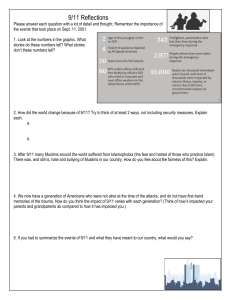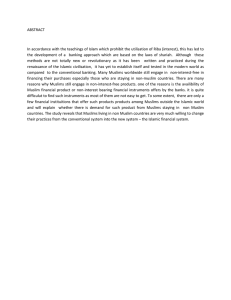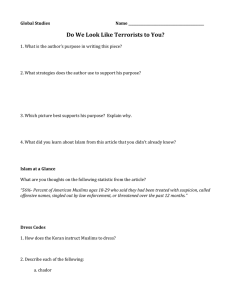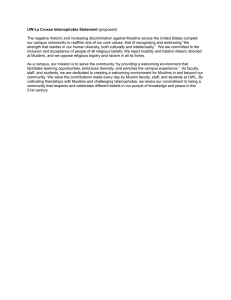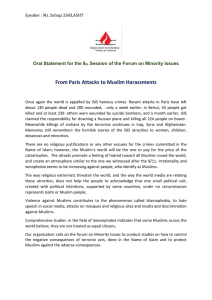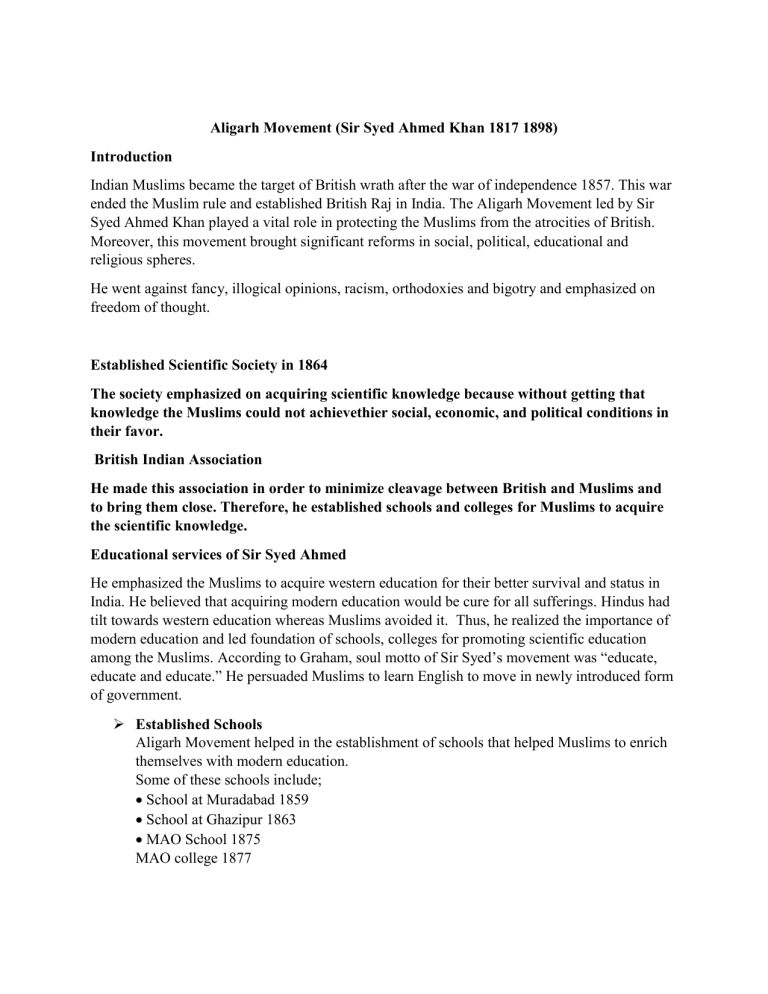
Aligarh Movement (Sir Syed Ahmed Khan 1817 1898) Introduction Indian Muslims became the target of British wrath after the war of independence 1857. This war ended the Muslim rule and established British Raj in India. The Aligarh Movement led by Sir Syed Ahmed Khan played a vital role in protecting the Muslims from the atrocities of British. Moreover, this movement brought significant reforms in social, political, educational and religious spheres. He went against fancy, illogical opinions, racism, orthodoxies and bigotry and emphasized on freedom of thought. Established Scientific Society in 1864 The society emphasized on acquiring scientific knowledge because without getting that knowledge the Muslims could not achievethier social, economic, and political conditions in their favor. British Indian Association He made this association in order to minimize cleavage between British and Muslims and to bring them close. Therefore, he established schools and colleges for Muslims to acquire the scientific knowledge. Educational services of Sir Syed Ahmed He emphasized the Muslims to acquire western education for their better survival and status in India. He believed that acquiring modern education would be cure for all sufferings. Hindus had tilt towards western education whereas Muslims avoided it. Thus, he realized the importance of modern education and led foundation of schools, colleges for promoting scientific education among the Muslims. According to Graham, soul motto of Sir Syed’s movement was “educate, educate and educate.” He persuaded Muslims to learn English to move in newly introduced form of government. Established Schools Aligarh Movement helped in the establishment of schools that helped Muslims to enrich themselves with modern education. Some of these schools include; School at Muradabad 1859 School at Ghazipur 1863 MAO School 1875 MAO college 1877 These schools helped Muslims to get the basics of modern education at their doorstep. Scientific Society Aligarh Movement helped in the creation and establishment of Scientific Society in 1864 which translated modern western knowledge into Urdu to help Muslims understand them easily. Aligarh Institute Gazzete (AIG) Aligarh Movemnt also launched a News Paper in 1866 with the name of Aligarh Institute Gazzete to highlight social, moral, educational and political problems of society particularly of Muslims of the Subcontinent. The paper was bilingual with English and Urdu columns. Tahzeebul Akhlaq Magazine Syed Ahmed established Tahzeebul Akhalq Magazine in 1870, the purpose of this magazine was to motivate the Muslims acquire civilization with its perfection so that they may also be regarded as respectable civilized nation. It also contributed to educate the Muslims to avoid from social and moral evils. Published books and magazines Khutbat-I Ahmadiya, Risala-e-Asbab-e-Baghawat-e-Hind, Tabeen-al-Kalam and Tahzibul Akhlaq. Committee for the advancement of Muslim education A committee was called in Benaras to analyze and know the reason that why Muslims were reluctant to send their children in government schools and having little interest in modern sciences. Finally, it was decided there was an urgent need of opening academic institutions, free from governmental influence, where they could also get their own religious education as well. All India Mohammad Educational Conference Aligarh Movement also began holding educational conferences such Muhammadan Educational Conference annually to analyze educational system and formulize new strategies for the improvement of educational system. Aligarh Movement: Political services of Sir Syed Ahmed After the war of independence 1857, the Muslims were subjected and tortured by the brutality of the British empires. Politically the Muslims rule became weaken, while the oust of Mughal empire by the dominance of White empires. The Muslims were marginalized politically due to certain reasons. Sir Syed Ahmed played a crucial role in protecting Muslims from the atrocities of British and conspiracies of Hindus. Political Awareness Muslims of the Subcontinent were completely unaware of the western political system and had no idea how it works. Aligarh Movement not only imparted knowledge of western political culture but also trained Muslims and guided them to fight for their rights. Resolved British-Muslims Relations British government and its forces in Sub-continent were considering Muslims sole responsible for the 1857 War of Independence and therefore they had adopted very strict policies to crush them. Muslims on the other hand were at odds with British forces too. Such an air of conflict and mistrust between Muslims and Britain had resulted in the deplorable conditions of the Muslims of India. To pacify the situation and create a sentiment of trust and friendship between the two nations, Aligarh Movement published Magazine on the causes of revolt of 1857 in which other nations of the Subcontinent were held as equal responsible as Muslims. Similarly, to further strengthen the relations between Britain and Muslims, Indian Patriotic Association and British Indian Association 1866 were created by the Aligarh Movement. Urdu- Hindi controversy When Hindu movement started to press for Bhasha language, Syed Ahmed believed that Two- Nations could not exist together. Aligarh Movement also played an important role in 1867 Urdu-Hindi controversy for the protection of Urdu, the language of Muslims of the Subcontinent. While using Aligarh Movement platform, he demanded from the government for the establishment of an institution where modern western knowledge can be translated into Urdu. Similarly Scientific Society was already in use for this purpose. Developed Two Nation Theory One of the major political services of Aligarh Movement was the presentation of Two Nation Theory, presented by Sir Syed Ahmed Khan, which became the basis of Pakistan Movement and finally the establishment of Pakistan in 1947. Opposition of the Indian National Congress Syed Ahmed opposed the Indian National Congress and its demands. He argued that India is not one nation state because of discrimination between Hindus and Muslims. He also opposed the demands of Congress such as the election of the members to the Legislative Councils and holding of the Civil Service Examination. He rejected election proposal while arguing that if the elections are held the Muslim candidate will surely loss the election because Hindus population is four times greater than Muslims. Moreover, the overall policies of Congress were Hindu-centric and that were opposing the rights of the minorities. Role of Aligarh Movement in Establishing Muslims League Aligarh Movement played a vital role in Muslims political awareness and established a separate political platform with the name of All India Muslim League. The league came into existence at the time when prominent Muslim leaders and scholars from all across the India had gathered for Muhammadan Educational Conference hold by the Aligarh Movement in 1906 in Dacca. Aligarh Movement helped Muslims to regain their lost status in society and also directed them in their political activities. It can be said that Aligarh Movement was the first organized step taken by the Muslims of Subcontinent towards the establishment of Pakistan. The Religious Services Aligarh Movement not only helped and guided Muslims from educational and political perspectives but also in religious perspectives. It published a number of books regarding religious matters such as “An Apology for Muhammad and Muhammadans” “Life of Muhammad”. “Khutbat-i-Ahmadiya” “Tahzib-ul-Akhlaq” “Tabaeen-al-Kalam” Impacts of Aligarh Movement It removed the element of mistrust between Muslims and British Imparted modern education to the Muslims of Sub-continent Brought economic prosperity to the Muslims of Subcontinent Helped in the protection and promotion of Urdu language Brought political awareness in Muslims of the Subcontinent Developed and promoted Two Nation Theory Educated Muslim community of the Subcontinent Established Muslim League Helped in the evolution of leadership in Muslim community Regained honorable status in Society Critical Analysis One of the major objections raised by the opponent of Aligarh Movement at that was its main and strong focus on the acquisition of western knowledge only. This step of Aligarh Movement took its followers and students away from religious education. To fill this gape a number of religious educational institutions were opened by other leaders of the Muslim community of Subcontinent of that time. Conclusion
